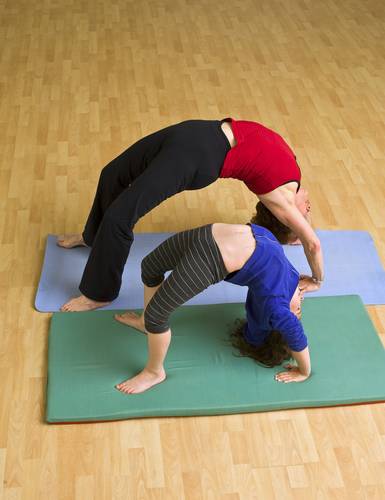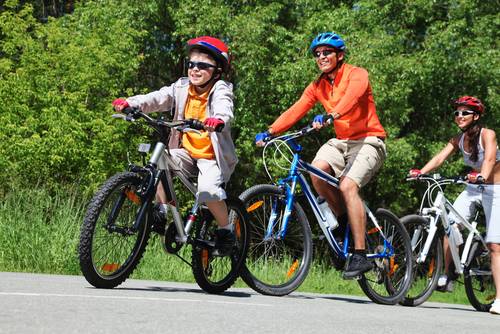It’s a classic scenario: Healthy, attractive Jack marries healthy, attractive Jill. They have a happy life and start having kids. It’s hard to juggle work, everyday life, and small, loud people running around making messes. Before you know it, Jack is obese with a chronic video game habit and Jill is overweight and frumpy. Their children have chronic health problems and are obese by the age of six.
Or there’s the other option: healthy, attractive Jack marries healthy, attractive Jill. They’re both classic type-A personalities and manage to frequent the gym five days a week despite the fact they also work overtime. They decide to have some kids who rebel during the teenage years because mom and dad are too obsessive, distant, and strict. In the meantime, Jill is battling depression and Jack is having an affair with the Pilates instructor.
These are some loose descriptions of a few families I’ve seen in movies recently. There have also been several studies that suggest parents are worse off than their peers who don’t have kids, mentally and physically. For example, a study released in 2011 found that “young children make parents less fit.” According to this study, mothers eat more calories and exercise less than their childless peers, and both moms and dads of young children exercise less frequently.
The good news is these are just caricatures of what it really means to be a parent. True, you might see examples of exhausted parents who have let themselves go or the other side of the spectrum, but these stereotypes only contain a grain of truth. If you’re a parent or considering plunging into parenthood someday soon, be on guard against these three half-truths regarding parents and exercise:
1. Parents Don’t Have Time or Energy to Exercise
It’s true, parenting is time-consuming. There are a million things to do and not enough time to do them all. I’ve found this is especially true right after a baby is born, but I haven’t experienced the teenage years yet, which I’m sure are absolutely insane with children being run all over creation for extracurricular activities. So yes, as a parent you will have less time than you did before.
But there’s also a hidden opportunity here: you can get a great lesson in time management and learn to make the most of the time you have. Your schedule might not be the linear, neat and tidy, step-by-step outline it used to be, but you’ll get creative and find ways to juggle. I love reading dad and powerlifter Chris Duffin’s journals every week and seeing the creative ways he manages to fit in his training.

Here is an example of what a typical week might look like in our own family of four:
MONDAY
- AM: 2 mile run (Mom), 45 min. kettlebell workout (Dad)
- NOON: Afternoon hike with kids (Mom, carrying a 30-lb. toddler in a hiking backpack, which is actually quite a workout!)
- PM: Krav Maga class (Dad), yoga at home (Mom)
TUESDAY
- AM: Bodyweight workout (together)
- NOON: Kettlebell workout (Mom)
- PM: Yoga together after kids are asleep
WEDNESDAY
- AM: 2 – 3 mile run (Mom), 45 min. kettlebells/weights (Dad)
- NOON: 2 mile walk/jog with kids (using the stroller this time)
- PM: Krav Maga class (Dad), Mom off due to taking daughters to dance lessons
THURSDAY
- AM: Weights/kettlebells/CrossFit workout (together)
- NOON: Off
- PM: Swim at the gym (Mom), yoga together when I get back
FRIDAY
- AM: Off
- NOON: Hike with kids (Mom)
- PM: Off
SATURDAY
- AM: Yoga (Mom), Krav Maga class (Dad)
- PM: Mom long run, Dad weights/kettlebells
SUNDAY
- Rest day/family hike time and weather permitting
2. Kids Don’t Let You Work Out
In one analysis of 495 parents, 40% said their children interfered with their workouts some of the time, and 17.9 percent reported their kids made it hard to exercise often or almost always. Yes, it is hard to get in a workout when your children are walking in front of you while you’re trying to do kettlebell swings. But again, this is only part of the story.
In reality, your children can be your biggest cheerleaders if you find ways to involve them in your training. If you’re looking for moral support as a parent, don’t underestimate the power of pint-sized cheerleaders. In the same study, parents were more likely to exercise when their children encouraged them to do so.
3. “That’s Just The Way It Is”
I was at a party a few months ago where a group of exhausted parents of children under five were having a dreadful discussion about the struggles of parenthood. It went something like this:
“I don’t know how these parents find time to stay in shape,” said Parent #1. “By the time I get home from work I’m so tired I just want to collapse.”
“It won’t last long,” observed the wise, seasoned Parent-of-five #2. I thought he was talking about Parent #1’s exhaustion, but he continued: “They probably only have one or two kids. Just give them a few years and they’ll be in the same boat. That’s just the way it is. You make sacrifices.”

It is true that parenting will necessarily bring a change of pace and a new perspective. It’s also true that you make sacrifices as a parent. But when you decide to start a family or have more children, remember it’s not a thorn in your side. Parenting has the potential to help you grow as a person. That pertains to everything, including your training and your health.
And of course, there are also the studies that show kids who have active parents are less likely to suffer from many of the chronic childhood health issues that have become so common today. So do yourself and your children a favor and don’t fall for the “I have kids” excuse.
References
1. J. Berge, N. Larson, et. al. Are Parents of Young Children Practicing Healthy Nutrition and Physical Activity Behaviors? Pediatrics Journal 2011, 127:5
2. H. Laroche and L. Snetselaar. Rural Parents and Exercise: Children as Barriers and Motivators Topics in Clinical Nutrition 2011, 26.3
Photos courtesy of Shutterstock.






